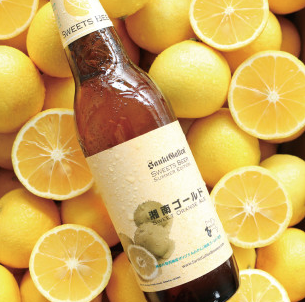Japanese craft breweries like Sankt Gallen have been making fruit beers for years. They’re about to get competition from the country’s industrial breweries.
On April 1st the tax laws relating to beer in Japan will change, and several additives which were previously prohibited in “beer” will become acceptable. Until now, spice or fruit additives to any malt beverage–in fact, any ingredient besides barley, wheat, corn, rice or sugar–would automatically put it into the “happoshu” category. Even classic fruited beers like Belgian oude kriek could not be sold in Japan as beer. After April 1st, however, this will all change. Fruit, spice, vegetables, flowers, chocolate, tea, coffee, oysters, seaweed, even bonito flakes will all be acceptable in beer as long as their amounts do not exceed 5% of the weight of the malt.
This law should not make any concrete difference to what most breweries are actually able to make—they already could use such ingredients, but simply had to label the resulting product happoshu instead of beer. It seems, however, that the law is having a motivating effect, as all four major brewing companies are already preparing new fruit beers or spice beers, aimed at younger drinkers, for April release. Beer fans will get to see an immediate impact.
On April 10th, Suntory will release two fruit beers in their “Beer Recipe from Across the Sea” series. The first is a wheat ale using orange peel and coriander and is said to have been inspired by Californian beer. The second is a cassis beer that gets its hint from Belgian fruited beers. It is not exactly clear how these recipes were inspired by these two respective areas.
On April 17th, Kirin will release a new version of their Hikouki Kumo to Watashi (Airplane, Clouds, and Me) saison, this time with lemon peel added. In June will come a Belgian White, Ame nochi Taiyo Belgian no Shiro (Sun after the Rain Belgian White) with orange peel and coriander.
According to Nikkei News, Sapporo will also release a beer using grapefruit and orange peel. It isn’t yet clear if this will be related to their Craft Label Secret Tap Grapefruit and Orange IPA, which was released in extremely limited quantities last summer.
Asahi will take a more unique approach. Their April 17th release, Gran Mild, will be a hefty 7% abv beer using lemon grass instead of fruit. Doesn’t sound all that mild at first hearing, though they claim it has a “refreshing richness.” Sadly, like most of Asahi’s specialty beers, this one contains rice, corn, and starch adjuncts as well. How about an all-malt spice beer next time?
It remains to be seen how this new law will affect craft breweries, many of which are already making various “happoshu” with fruit and spices. If the reaction of the majors is any indication, however, we can expect to see an onslaught of new experimentation.
Whether or not this April 1st will be an April Fool’s Day for the Japanese beer scene will depend on if these brewers will be seriously trying to brew well-planned, well-executed fruit beers, or if they are just trying to ride a new marketing wave by throwing various popular additives willy-nilly into their beers. It should be fun for us to find out.
By Professor Mark Meli, author of Craft Beer in Japan: the Essential Guide




